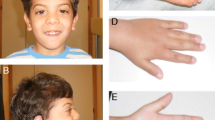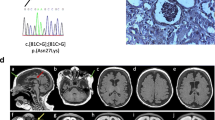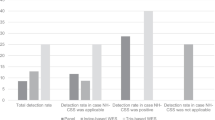Abstract
Meckel–Gruber syndrome (MKS) is a recessively inherited, lethal disorder characterized by renal cystic dysplasia, occipital encephalocele, polydactyly and biliary dysgenesis. MKS is genetically heterogeneous with three loci mapped and two identified; MKS1 (17q23) and MKS3 (8q22.1). MKS1 is part of the Finnish disease heritage, while MKS3 has been described exclusively in consanguineous Asian families. Here we aimed to establish molecular diagnostics for MKS, determine the importance of MKS1 and MKS3 in non-consanguineous populations, and study genotype/phenotype correlations. The coding regions of MKS1 and MKS3 were screened for mutations by direct sequencing in 17 families clinically diagnosed with MKS in the US or The Netherlands. The clinical phenotype was compared to genic and allelic effects. Both mutations were identified in ten families; five MKS1 and five MKS3. All but two were compound heterozygotes, consistent with their non-consanguineous nature. The MKS1-Finmajor mutation accounted for 7/10 MKS1 mutations; two novel changes were additionally detected. Seven novel mutations were found in MKS3, including three missense changes. We concluded that MKS1 and MKS3 account for the majority of MKS in non-consanguineous populations of European origin. Polydactyly is usually found in MKS1 but rare in MKS3. Cases with no, or milder, CNS phenotypes were only found in MKS3; hypomorphic missense mutations may be associated with less severe CNS outcomes. This study is consistent with further genetic heterogeneity of MKS, but underlines the value of molecular diagnostics of the known genes to aid family planning decisions.



Similar content being viewed by others
References
Alexiev BA, Lin X, Sun CC, Brenner DS (2006) Meckel–Gruber syndrome: pathologic manifestations, minimal diagnostic criteria, and differential diagnosis. Arch Pathol Lab Med 130:1236–1238
Baala L, Romano S, Khaddour R, Saunier S, Smith UM, Audollent S, Ozilou C, Faivre L, Laurent N, Foliguet B, Munnich A, Lyonnet S, Salomon R, Encha-Razavi F, Gubler MC, Boddaert N, Lonlay P, Johnson CA, Vekemans M, Antignac C, Attie-Bitach T (2007) The Meckel–Gruber syndrome gene, MKS3, is mutated in Joubert syndrome. Am J Hum Genet 80:186–194
Bergmann C, Senderek J, Sedlacek B, Pegiazoglou I, Puglia P, Eggermann T, Rudnik-Schneborn S, Furu L, Onuchic LF, De Baca M, Germino GG, Guay-Woodford L, Somlo S, Moser M, Buttner R, Zerres K (2003) Spectrum of mutations in the gene for autosomal recessive polycystic kidney disease (ARPKD/PKHD1). J Am Soc Nephrol 14:76–89
Bernstein J, Brough AJ, McAdams AJ (1974) The renal lesion in syndromes of multiple congenital malformations. Cerebrohepatorenal syndrome; Jeune asphyxiating thoracic dystrophy; tuberous sclerosis; Meckel syndrome. Birth Defects Orig Artic Ser 10:35–43
Castilla EE, Lugarinho R, da Graca Dutra M, Salgado LJ (1998) Associated anomalies in individuals with polydactyly. Am J Med Genet 80:459–465
Chaumoitre K, Brun M, Cassart M, Maugey-Laulom B, Eurin D, Didier F, Avni EF (2006) Differential diagnosis of fetal hyperechogenic cystic kidneys unrelated to renal tract anomalies: a multicenter study. Ultrasound Obstet Gynecol 28:911–917
Cincinnati P, Neri ME, Valentini A (2000) Dandy–Walker anomaly in Meckel–Gruber syndrome. Clin Dysmorphol 9:35–38
Dawe HR, Smith UM, Cullinane AR, Gerrelli D, Cox P, Badano JL, Blair-Reid S, Sriram N, Katsanis N, Attie-Bitach T, Afford SC, Copp AJ, Kelly DA, Gull K, Johnson CA (2007) The Meckel–Gruber syndrome proteins MKS1 and meckelin interact and are required for primary cilium formation. Hum Mol Genet 16:173–186
Diaz-Cano SJ, Brady SP (1997) DNA extraction from formalin-fixed, paraffin-embedded tissues: protein digestion as a limiting step for retrieval of high-quality DNA. Diagn Mol Pathol 6:342–346
Dodé C, Rochette J, Krishnamoorthy R (1990) Locus assignment of human α globin mutations by selective amplification and direct sequencing. Br J Haematol 76:275–281
Green JS, Parfrey PS, Harnett JD, Farid NR, Cramer BC, Johnson G, Heath O, McManamon PJ, O’Leary E, Pryse-Phillips W (1989) The cardinal manifestations of Bardet–Biedl syndrome, a form of Laurence–Moon–Biedl syndrome. N Engl J Med 321:1002–1009
Holmes LB, Driscoll SG, Atkins L (1976) Etiologic heterogeneity of neural-tube defects. N Engl J Med 294:365–369
Karmous-Benailly H, Martinovic J, Gubler MC, Sirot Y, Clech L, Ozilou C, Auge J, Brahimi N, Etchevers H, Detrait E, Esculpavit C, Audollent S, Goudefroye G, Gonzales M, Tantau J, Loget P, Joubert M, Gaillard D, Jeanne-Pasquier C, Delezoide AL, Peter MO, Plessis G, Simon-Bouy B, Dollfus H, Le Merrer M, Munnich A, Encha-Razavi F, Vekemans M, Attie-Bitach T (2005) Antenatal presentation of Bardet–Biedl syndrome may mimic Meckel syndrome. Am J Hum Genet 76:493–504
Kyttala M, Tallila J, Salonen R, Kopra O, Kohlschmidt N, Paavola-Sakki P, Peltonen L, Kestila M (2006) MKS1, encoding a component of the flagellar apparatus basal body proteome, is mutated in Meckel syndrome. Nat Genet 38:155–157
Maria BL, Boltshauser E, Palmer SC, Tran TX (1999) Clinical features and revised diagnostic criteria in Joubert syndrome. J Child Neurol 14:583–590; discussion 590–581
Mittermayer C, Lee A, Brugger PC (2004) Prenatal diagnosis of the Meckel–Gruber syndrome from 11th to 20th gestational week. Ultraschall Med 25:275–279
Morgan NV, Gissen P, Sharif SM, Baumber L, Sutherland J, Kelly DA, Aminu K, Bennett CP, Woods CG, Mueller RF, Trembath RC, Maher ER, Johnson CA (2002) A novel locus for Meckel–Gruber syndrome, MKS3, maps to chromosome 8q24. Hum Genet 111:456–461
Paavola P, Salonen R, Weissenbach J, Peltonen L (1995) The locus for Meckel syndrome with multiple congenital anomalies maps to chromosome 17q21-q24. Nat Genet 11:213–215
Paavola P, Salonen R, Baumer A, Schinzel A, Boyd PA, Gould S, Meusburger H, Tenconi R, Barnicoat A, Winter R, Peltonen L (1997) Clinical and genetic heterogeneity in Meckel syndrome. Hum Genet 101:88–92
Reese MG, Eeckman FH, Kulp D, Haussler D (1997) Improved splice site detection in Genie. J Comput Biol 4:311–323
Roume J, Genin E, Cormier-Daire V, Ma HW, Mehaye B, Attie T, Razavi-Encha F, Fallet-Bianco C, Buenerd A, Clerget-Darpoux F, Munnich A, Le Merrer M (1998) A gene for Meckel syndrome maps to chromosome 11q13. Am J Hum Genet 63:1095–1101
Salonen R (1984) The Meckel syndrome: clinicopathological findings in 67 patients. Am J Med Genet 18:671–689
Salonen R, Norio R (1984) The Meckel syndrome in Finland: epidemiologic and genetic aspects. Am J Med Genet 18:691–698
Salonen R, Paavola P (1998) Meckel syndrome. J Med Genet 35:497–501
Seller MJ (1978) Meckel syndrome and the prenatal diagnosis of neural tube defects. J Med Genet 15:462–465
Sergi C, Adam S, Kahl P, Otto HF (2000) Study of the malformation of ductal plate of the liver in Meckel syndrome and review of other syndromes presenting with this anomaly. Pediatr Dev Pathol 3:568–583
Simpson JL, Mills J, Rhoads GG, Cunningham GC, Conley MR, Hoffman HJ (1991) Genetic heterogeneity in neural tube defects. Ann Genet 34:279–286
Smith UM, Consugar M, Tee LJ, McKee BM, Maina EN, Whelan S, Morgan NV, Goranson E, Gissen P, Lilliquist S, Aligianis IA, Ward CJ, Pasha S, Punyashthiti R, Malik Sharif S, Batman PA, Bennett CP, Woods CG, McKeown C, Bucourt M, Miller CA, Cox P, Algazali L, Trembath RC, Torres VE, Attie-Bitach T, Kelly DA, Maher ER, Gattone VH, Harris PC, Johnson CA (2006) The transmembrane protein meckelin (MKS3) is mutated in Meckel–Gruber syndrome and the wpk rat. Nat Genet 38:191–196
Stevenson RE, Allen WP, Pai GS, Best R, Seaver LH, Dean J, Thompson S (2000) Decline in prevalence of neural tube defects in a high-risk region of the United States. Pediatrics 106:677–683
Summers MC, Donnenfeld AE (1995) Dandy–Walker malformation in the Meckel syndrome. Am J Med Genet 55:57–61
Walpole IR, Goldblatt J, Hockey A, Knowles S (1991) Dandy–Walker malformation (variant), cystic dysplastic kidneys, and hepatic fibrosis: a distinct entity or Meckel syndrome? Am J Med Genet 39:294–298
Acknowledgments
The many physicians, genetic counselors, and families are thanked for their involvement in this study, and for providing comprehensive clinical records. This work was supported by NIDDK grant DK68581.
Author information
Authors and Affiliations
Corresponding author
Electronic supplementary material
Rights and permissions
About this article
Cite this article
Consugar, M.B., Kubly, V.J., Lager, D.J. et al. Molecular diagnostics of Meckel–Gruber syndrome highlights phenotypic differences between MKS1 and MKS3. Hum Genet 121, 591–599 (2007). https://doi.org/10.1007/s00439-007-0341-3
Received:
Accepted:
Published:
Issue Date:
DOI: https://doi.org/10.1007/s00439-007-0341-3




